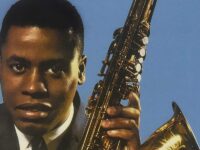Kind Of Blue has long been touted as the best jazz album ever made, and I remain on that big bandwagon. But what’s the second best? There, a person’s answer is likely to reveal much more about their individual predilection. My own reply changes from day to day, but I’m certain of one record that will always be in that top 2-5 range, and that’s Wayne Shorter’s Speak No Evil. This is the album where his substantial songwriting prowess reached full maturity, and brought to life by musicians who were also just attaining the peak of their powers. To top it off, Evil was superbly recorded by the legendary engineer Rudy Van Gelder for the legendary Blue Note label at a time when that legend was being made with classic or near-classic albums on a weekly basis.
My personal favorite track remains the launch track that Shorter named “Witch Hunt.” As the title might suggest, it’s full of drama, foreboding and dark overtones, and Shorter does it by leveraging ideas of jazz that has come before and incorporating some new ideas new to jazz such as quartal harmony to create something fresh, cerebral and visceral.
The salutary opening phrase expressed in harmony by Shorter’s tenor sax and Freddie Hubbard’s trumpet and never repeated again, seems to want to go in so many directions at once. Instead of signaling a dense, impenetrable narrative, it quickly gives way to a sauntering blues walk.
Elvin Jones, who had just recorded A Love Supreme with John Coltrane three weeks before this Christmas Eve, 1964 session, bonds his drums with Ron Carter’s bass to establish that walk and as the theme unfolds, he’s dropping well-placed bombs and accents. That leads up to one of his finest moments, a beat-stopping fill and splashes that transitions the song to the solos section, setting Shorter off into orbit.
Shorter, in his classic angular style stylistically opposed to Coltrane, never did have to do rapid runs up and down scales to convey how meaningful his saxophone articulations are. That steady, RnB-styled but weighty tone here, as it always is, was plenty good enough. Hubbard follows that cool with the “hot,” though Freddie modulated himself carefully so as to not make the song boil over and ruin the mood, and Elvin is keeping closely attuned to his mood. Finally, Herbie Hancock, another Miles Davis band mate of Shorter’s, cools things down again with thoughtful combinations of left hand block chords and right hand single line funky blues phrases that glance back at Bud Powell and Wynton Kelly. Another go around with the tense theme and Jones takes it out with one last bomb.
In case you haven’t heard, Wayne Shorter is 80 years old today. He continues to inspire the two or three generations of jazz performers after him with songs and performances conceived a half century ago, all while he continues to inspire with the music he makes in the present day (like Without A Net). I don’t have the time or space to run down the reasons why this quiet, self-effacing person is such a significant figure in jazz, but his genius has been written and spoken about plenty already.
Suffice to say that eighty years after Wayne Shorter was born, we are still a witness to the man’s physical presence…and a spiritual presence that should endure for far, far longer.
[amazon_enhanced asin=”B000SZHO1K” /] [amazon_enhanced asin=”B00000I8UH” /] [amazon_enhanced asin=”B00A4OALL0″ /] [amazon_enhanced asin=”B00000IWVU” /] [amazon_enhanced asin=”B0012GMZIG” /]
- Ches Smith Quartet – ‘Clone Row’ (2025) - May 30, 2025
- James Brandon Lewis Quartet – ‘Abstraction Is Deliverance’ (2025) - May 27, 2025
- Soft Machine – ‘Drop’ (1971, 2025 remaster) - May 21, 2025




Thanx – I have a cassette copy of this that I haven’t played for years…….. I’ll have to go dig it out of the backroom.